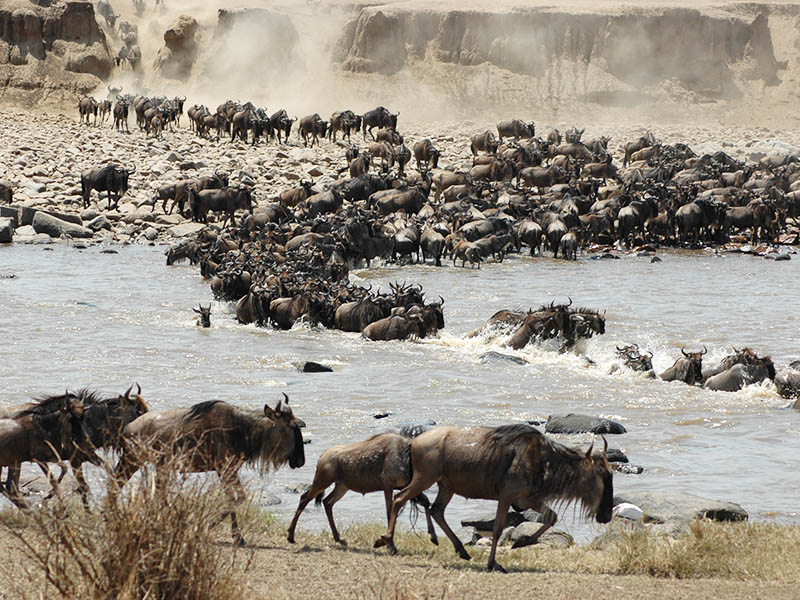The Wild Vibe of African Safaris


- What is Migration
Migration is the movement of animals from point A to
Point B, then return to Point A to
complete the circle.
- There are two types of
Migration:
1-Emigration: This is when the
masses of Wildebeests and Zebras are moving out of the Country to Masai Mara
national reserve in Kenya.
2-Immigration: This is when the
masses of Wildebeests and Zebras coming back to Serengeti Tanzania from Masai Mara.
The Serengeti Wildebeests Migration starts in the
southern part of the Serengeti National Park. All ungulates will be in the
South. After smelling the rain as see lightening (Thunderstorm) they go to the
central part of the Serengeti which is wet. In this Migration, the Animal is
classified into three (3) Groups. These groups have given the names according
to the routes which they go through.
1-Central Herd: The largest herd
of Wildebeests and Zebras, which moves from Southern part to the central part
then proceed to the Northern part of the Serengeti National Park.
2-Eastern Herd: This is the
second-largest herd of Wildebeests and Zebras which moves from the Eastern part
of the Serengeti National park in Gol and Barafu Kopjes to the Northern part of
the Serengeti National park.
3-Western Herd: This is the last and
small herd of Wildebeests and Zebras, which carries Tired, Lame, Sick, Old and
Babies which lost their mothers. This herd moves from Southern part of the
Serengeti heading to the Western part, where they will cross the Grumeti River
and go to the Northern part of the Serengeti. This herd is also known as Back
Herd as it moves slowly and is the last herd to get to the Northern part of the
Serengeti National park.
All these three herds will meet together in the Northern
part of the Serengeti National park, grazing, and drinking. Depending on the
rain in the Northern part, if it rains more in Masai Mara in Kenya, 80% of all
Wildebeests and Zebras will cross the Mara river and go Masai Mara in Kenya. But if
it rains more in the Northern part of the Serengeti, only 20% will cross the
river and go to Masai Mara in Kenya, and 80% will remain in the Northern part.
-Why do they Migrate?
To look for food (Climatically changes)
Look for Water
Look for breeding sites.
-What is the direction
of Migration?
Clockwise Direction: Following rainfall pattern in the
Serengeti ecosystem.
-How do they know their
routes?
They have brain Instinct (Internal clock) to remember and
know crossings.
-Which animal leads
Migration and why?
Zebras lead Migration because they have good memory and
wide mouth to level down the high grass for the Wildebeest.
-Why Wildebeests drop
their babies in the Serengeti Southern grass plain?
-Good vision-Sight to see predators and escape them as
the country is flat.
-Good terrain to allow Calves to practice walking and
running.
-Good pasture and water during the rains.
-Well-drained area not waterlogged.
-Availability of essential minerals in the grasses for
teeth and bones of the calves and for the lactating cows to increase milk
production and to return minerals lost during parturition time.
-The minerals found in the Southern short grass plains
are Calcium, Phosphorous, and Iron. Iodine and Magnesium.